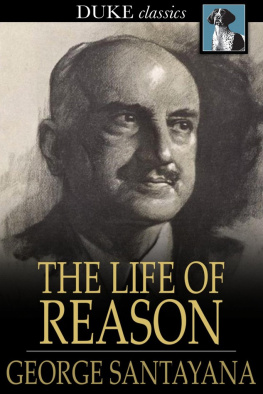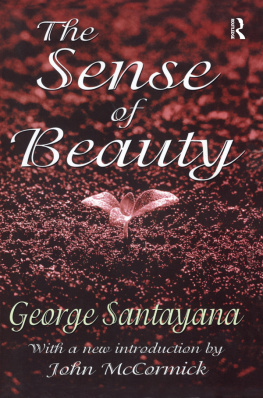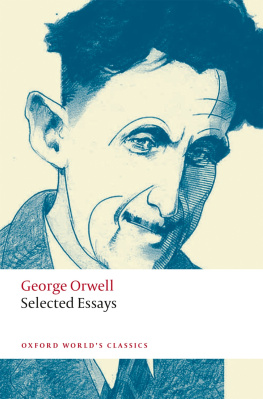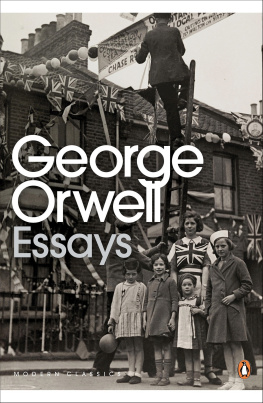Santayana George - Some Turns of Tought in Modern Philosophy Five Essays
Here you can read online Santayana George - Some Turns of Tought in Modern Philosophy Five Essays full text of the book (entire story) in english for free. Download pdf and epub, get meaning, cover and reviews about this ebook. genre: Science. Description of the work, (preface) as well as reviews are available. Best literature library LitArk.com created for fans of good reading and offers a wide selection of genres:
Romance novel
Science fiction
Adventure
Detective
Science
History
Home and family
Prose
Art
Politics
Computer
Non-fiction
Religion
Business
Children
Humor
Choose a favorite category and find really read worthwhile books. Enjoy immersion in the world of imagination, feel the emotions of the characters or learn something new for yourself, make an fascinating discovery.
- Book:Some Turns of Tought in Modern Philosophy Five Essays
- Author:
- Genre:
- Rating:5 / 5
- Favourites:Add to favourites
- Your mark:
- 100
- 1
- 2
- 3
- 4
- 5
Some Turns of Tought in Modern Philosophy Five Essays: summary, description and annotation
We offer to read an annotation, description, summary or preface (depends on what the author of the book "Some Turns of Tought in Modern Philosophy Five Essays" wrote himself). If you haven't found the necessary information about the book — write in the comments, we will try to find it.
Some Turns of Tought in Modern Philosophy Five Essays — read online for free the complete book (whole text) full work
Below is the text of the book, divided by pages. System saving the place of the last page read, allows you to conveniently read the book "Some Turns of Tought in Modern Philosophy Five Essays" online for free, without having to search again every time where you left off. Put a bookmark, and you can go to the page where you finished reading at any time.
Font size:
Interval:
Bookmark:
The Project Gutenberg EBook of Some Turns of Thought in Modern Philosophy
by George Santayana
This eBook is for the use of anyone anywhere at no cost and with
almost no restrictions whatsoever. You may copy it, give it away or
re-use it under the terms of the Project Gutenberg License included
with this eBook or online at www.gutenberg.net
Title: Some Turns of Thought in Modern Philosophy
Five Essays
Author: George Santayana
Release Date: September 17, 2005 [EBook #16712]
Language: English
*** START OF THIS PROJECT GUTENBERG EBOOK SOME TURNS OF THOUGHT IN ***
Produced by Juliet Sutherland, Michael Ciesielski and the
Online Distributed Proofreading Team at http://www.pgdp.net
NEW YORK
CHARLES SCRIBNER'S SONS
1933
Published under the auspices of
THE ROYAL SOCIETY OF LITERATURE
PRINTED IN GREAT BRITAIN
| page | |
|---|---|
| I. Locke and the Frontiers of Common Sense Paper read before the Royal Society of Literature on the occasion of the Tercentenary of the birth of John Locke. With some Supplementary Notes | 1 |
| II. Fifty Years of British Idealism Reflections on the republication of Bradley's Ethical Studies | 48 |
| III. Revolutions in Science Some Comments on the Theory of Relativity and the new Physics | 71 |
| IV. A Long Way Round to Nirvana Development of a suggestion found in Freud's Beyond the Pleasure Principle | 87 |
| V. The Prestige of the Infinite A review of Julien Benda's Sketch of a consistent theory of the relations between God and the World | 102 |
The Author's acknowledgments are due to the Editors of The New Adelphi, The Dial, and the Journal of Philosophy, in which one or more of these Essays originally appeared.
A good portrait of Locke would require an elaborate background. His is not a figure to stand statuesquely in a void: the pose might not seem grand enough for bronze or marble. Rather he should be painted in the manner of the Dutch masters, in a sunny interior, scrupulously furnished with all the implements of domestic comfort and philosophic enquiry: the Holy Bible open majestically before him, and beside it that other revelationthe terrestrial globe. His hand might be pointing to a microscope set for examining the internal constitution of a beetle: but for the moment his eye should be seen wandering through the open window, to admire the blessings of thrift and liberty manifest in the people so worthily busy in the market-place, wrong as many a monkish notion might be that still troubled their poor heads. From them his enlarged thoughts would easily pass to the stout carved ships in the river beyond, intrepidly setting sail for the Indies, or for savage America. Yes, he too had travelled, and not only in thought. He knew how many strange nations and false religions lodged in this round earth, itself but a speck in the universe. There were few ingenious authors that he had not perused, or philosophical instruments that he had not, as far as possible, examined and tested; and no man better than he could understand and prize the recent discoveries of "the incomparable Mr Newton". Nevertheless, a certain uneasiness in that spare frame, a certain knitting of the brows in that aquiline countenance, would suggest that in the midst of their earnest eloquence the philosopher's thoughts might sometimes come to a stand. Indeed, the visible scene did not exhaust the complexity of his problem; for there was also what he called "the scene of ideas", immaterial and private, but often more crowded and pressing than the public scene. Locke was the father of modern psychology, and the birth of this airy monster, this half-natural changeling, was not altogether easy or fortunate.[2]
I wish my erudition allowed me to fill in this picture as the subject deserves, and to trace home the sources of Locke's opinions, and their immense influence. Unfortunately, I can consider himwhat is hardly faironly as a pure philosopher: for had Locke's mind been more profound, it might have been less influential. He was in sympathy with the coming age, and was able to guide it: an age that confided in easy, eloquent reasoning, and proposed to be saved, in this world and the next, with as little philosophy and as little religion as possible. Locke played in the eighteenth century very much the part that fell to Kant in the nineteenth. When quarrelled with, no less than when embraced, his opinions became a point of departure for universal developments. The more we look into the matter, the more we are impressed by the patriarchal dignity of Locke's mind. Father of psychology, father of the criticism of knowledge, father of theoretical liberalism, god-father at least of the American political system, of Voltaire and the Encyclopaedia, at home he was the ancestor of that whole school of polite moderate opinion which can unite liberal Christianity with mechanical science and with psychological idealism. He was invincibly rooted in a prudential morality, in a rationalised Protestantism, in respect for liberty and law: above all he was deeply convinced, as he puts it, "that the handsome conveniences of life are better than nasty penury". Locke still speaks, or spoke until lately, through many a modern mind, when this mind was most sincere; and two hundred years before Queen Victoria he was a Victorian in essence.
A chief element in this modernness of Locke was something that had hardly appeared before in pure philosophy, although common in religion: I mean, the tendency to deny one's own presuppositionsnot by accident or inadvertently, but proudly and with an air of triumph. Presuppositions are imposed on all of us by life itself: for instance the presupposition that life is to continue, and that it is worth living. Belief is born on the wing and awakes to many tacit commitments. Afterwards, in reflection, we may wonder at finding these presuppositions on our hands and, being ignorant of the natural causes which have imposed them on the animal mind, we may be offended at them. Their arbitrary and dogmatic character will tempt us to condemn them, and to take for granted that the analysis which undermines them is justified, and will prove fruitful. But this critical assurance in its turn seems to rely on a dubious presupposition, namely, that human opinion must always evolve in a single line, dialectically, providentially, and irresistibly. It is at least conceivable that the opposite should sometimes be the case. Some of the primitive presuppositions of human reason might have been correct and inevitable, whilst the tendency to deny them might have sprung from a plausible misunderstanding, or the exaggeration of a half-truth: so that the critical opinion itself, after destroying the spontaneous assumptions on which it rested, might be incapable of subsisting.
In Locke the central presuppositions, which he embraced heartily and without question, were those of common sense. He adopted what he calls a "plain, historical method", fit, in his own words, "to be brought into well-bred company and polite conversation". Men, "barely by the use of their natural faculties", might attain to all the knowledge possible or worth having. All children, he writes, "that are born into this world, being surrounded with bodies that perpetually and diversely affect them" have "a variety of ideas imprinted" on their minds. "External material things as objects of Sensation, and the operations of our own minds as objects of Reflection, are to me", he continues, "the only originals from which all our ideas take their beginnings." "Every act of sensation", he writes elsewhere, "when duly considered, gives us an equal view of both parts of nature, the corporeal and the spiritual. For whilst I know, by seeing or hearing,... that there is some corporeal being without me, the object of that sensation, I do more certainly know that there is some spiritual being within me that sees and hears."
Font size:
Interval:
Bookmark:
Similar books «Some Turns of Tought in Modern Philosophy Five Essays»
Look at similar books to Some Turns of Tought in Modern Philosophy Five Essays. We have selected literature similar in name and meaning in the hope of providing readers with more options to find new, interesting, not yet read works.
Discussion, reviews of the book Some Turns of Tought in Modern Philosophy Five Essays and just readers' own opinions. Leave your comments, write what you think about the work, its meaning or the main characters. Specify what exactly you liked and what you didn't like, and why you think so.






![Santayana - The life of reason, [or], the phases of human progress](/uploads/posts/book/233706/thumbs/santayana-the-life-of-reason-or-the-phases-of.jpg)


